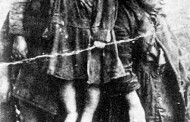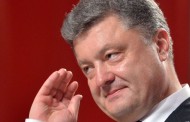When Ukrainians toppled a pro-Russian president last year, nowhere was the euphoria greater than in Lviv, a short drive from the EU border, where people have dreamt for generations of escaping Moscow’s orbit to join the West.
More than a year of war and economic collapse later, nowhere else has the disillusionment been felt more harshly.
“Everyone thought Ukraine would suddenly turn into Poland,” said mechanic Taras Yakubovsky, sitting by a cast-iron woodburner in his small garage, where work has dried up because customers can no longer afford car repairs. “But we’ve become more like Europe’s Somalia.”
Part of the Austrian empire until World War I, this city of baroque churches and cobbled streets looks more like Mitteleuropa than the ex-Soviet Union, which it joined only after Red Army tanks rolled in and seized it from Poland in 1939.
Its residents, known for their fierce nationalist streak and pro-European outlook, traveled by busload to Kiev last year, forming the core of the “Maidan” movement on the capital’s central square that toppled President Viktor Yanukovich after he rejected a free trade pact with the EU.
When that revolt was followed by war with pro-Russian militias in the distant east, Lviv residents were among the most enthusiastic volunteers. The furthest major city in Ukraine from the war zone, it has suffered some of the highest per capita losses in a conflict that has killed more than 6,000 people.
But after a tough winter and with no sign of economic pain ending any time soon, support for the war is eroding, even here. According to a poll by research company GfK, over half of residents of western regions believe the government must avoid further bloodshed at any cost.
“We understand it’s difficult times, but they’re tossing away money on the war, and someone in Kiev will definitely be making some money off it too,” Yakubovsky said.
Donations to the war effort have dropped noticeably, said part-time volunteer Yuriy Yatnisa, 24, standing in an old military tent that serves as a makeshift center to collect money and food for the troops at the front.
“Everybody helps however they can, but it’s hard – we get a lot less than last year. It’s not just that they can’t afford to give as much, it’s also because people have become used to living in a country at war, it’s a normal part of daily life now,” Yatnisa said.
MOST TO GAIN
Ukraine’s western provinces have the most to gain from closer trade ties with Europe. Officials say lifting EU trade barriers could mean European firms opening factories here just inside the border, bringing jobs and investment, as they did in countries like Poland since the fall of the Berlin Wall.
Ukraine’s population of 45 million is well educated and its labor is cheaper than in new EU countries nearby.
Some firms have already begun to find opportunities for increased trade with the EU. Yarych Confectionary, a Lviv cracker factory, announced in October it had begun making butter biscuits for Carrefour supermarkets to sell under their own name in Poland.
But so far, such benefits are still mostly hypothetical, while the damage brought by the war and economic crisis is real. The hryvnia national currency has collapsed, dragging down the value of the average monthly salary to just $150 per month.
In February, when the currency went into freefall, there was panic buying of basic foodstuffs. Some supermarkets in Lviv introduced short-term rationing after their shelves were emptied of flour and cooking oil.
Those who do business abroad have a hard time convincing customers that Western Ukraine is stable and far from the war zone, said Olena Linik, 29, who works for an American company that employs Ukrainians to design software in Lviv.
“We explained to our clients that from Lviv to east Ukraine, it’s 1,000 kilometers – the same distance as from here to Venice,” she said. “But many companies are put off by the instability.”
She said a friend of hers had lost his job creating logos, because the firm he worked for moved its business to Taiwan from Lviv.
Still, some in Western Ukraine see opportunities already arriving. The weak hryvnia helps a domestic tourist trade, with those who can no longer afford to travel abroad coming to visit Lviv’s old churches and cafes, and ski western Ukraine’s Carpathian mountains.
“A trip to Europe has become too expensive for many,” said Markiyan Malskyy of the European Business Association, a trade group for foreign companies operating in Ukraine which has an office in Lviv.
http://www.reuters.com/article/2015/04/10/us-ukraine-crisis-west-idUSKBN0N112E20150410
- Будь в курсе последних новостей и интересных статей, подписывайся на наш канал «NovorossiaToday»
- Be aware of the current events and interesting articles, subscribe to our channel «NovorossiaToday»
- Pour ne rien manquer de la derniere actualite et des articles interessants, suis notre chaine Telegram en direct«NovorossiaToday»




